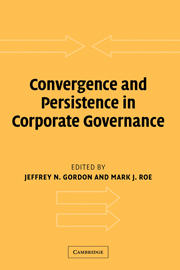Book contents
- Frontmatter
- Contents
- List of figures
- List of tables
- List of contributors
- Acknowledgments
- Introduction
- PART I Systemic issues
- PART II Government players
- 5 The international relations wedge in the corporate convergence debate
- 6 Property rights in firms
- 7 Modern politics and ownership separation
- PART III Specific institutions
- Index
5 - The international relations wedge in the corporate convergence debate
Published online by Cambridge University Press: 04 March 2010
- Frontmatter
- Contents
- List of figures
- List of tables
- List of contributors
- Acknowledgments
- Introduction
- PART I Systemic issues
- PART II Government players
- 5 The international relations wedge in the corporate convergence debate
- 6 Property rights in firms
- 7 Modern politics and ownership separation
- PART III Specific institutions
- Index
Summary
Introduction
This chapter tries to move the corporate governance convergence debate away from the arguments over efficiency and politics towards what I will call the international relations perspective. This move has two implications. First, the pace of convergence in corporate governance is understood to depend crucially on a country's, or, perhaps more importantly, on a group of countries' commitment to a project of transnational economic and political integration. Second, this transnational project may be best advanced by the spread of diffusely held public firms on the Anglo-American model, because such ownership structures facilitate the contestability of control, which helps curb economic nationalism. So, both as a positive and normative matter, we may understand such “strong form” convergence as responding to a particular sort of political aspiration, not just efficiency grounds conventionally understood. Examples drawn from the evolution of German shareholder capitalism during the 1990s in the context of the European Union project will illustrate the argument.
The corporate convergence debate is usually presented in terms of competing efficiency and political claims. Convergence optimists assert that an economic logic will promote convergence on the most efficient form of economic organization, usually taken to be the public corporation governed under rules designed to maximize shareholder value. Convergence skeptics counterclaim that organizational diversity is possible, even probable, because of path-dependent development of institutional complementarities whose abandonment is likely to be inefficient.
- Type
- Chapter
- Information
- Convergence and Persistence in Corporate Governance , pp. 161 - 209Publisher: Cambridge University PressPrint publication year: 2004
- 9
- Cited by



